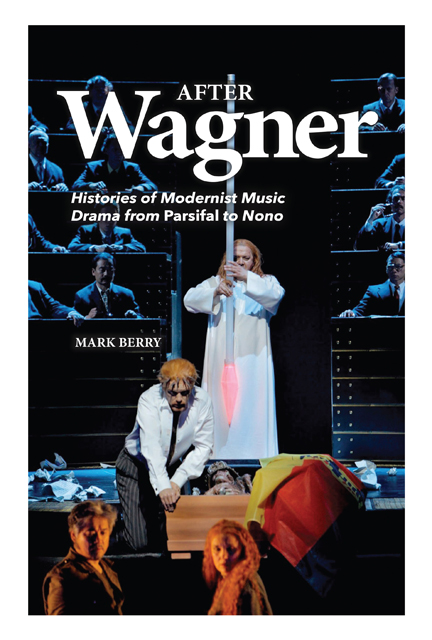Book contents
- Frontmatter
- Contents
- List of Music Examples
- Acknowledgements
- Dedication
- Introduction: ‘After Wagner’
- Part I In the Shadow of German Idealism: From Parsifal to Capriccio
- Part II Composition after the Second World War: From Germany to Italy, and Back Again?
- Part III Performance and the Fruitful Instability of the Work: From Parsifal to Nono
- Bibliography
- Index
5 - Luigi Nono, Intolleranza 1960
Published online by Cambridge University Press: 24 February 2023
- Frontmatter
- Contents
- List of Music Examples
- Acknowledgements
- Dedication
- Introduction: ‘After Wagner’
- Part I In the Shadow of German Idealism: From Parsifal to Capriccio
- Part II Composition after the Second World War: From Germany to Italy, and Back Again?
- Part III Performance and the Fruitful Instability of the Work: From Parsifal to Nono
- Bibliography
- Index
Summary
Foremost amongst the politically engaged Italian composers of the generation after Dallapiccola was Luigi Nono. A Venetian by birth (1924) and death (1990), he also, like Dallapiccola and many others, evinced considerable interest in early ‘Italian’, often Venetian, music; Nono’s final music drama, Prometeo, often conjures up the impression of a marriage between Marx and Palestrina, mediated by Walter Benjamin and Nono’s librettist, Massimo Cacciari. For, as Nono’s friend and colleague, Claudio Abbado, attested, Nono ‘never lost the deep-rooted ties to the long tradition of Venetian music, as demonstrated by his unerring feeling for the relation of sound and space, recalling the music Gabrieli wrote for the church of San Marco. Gigi’s sense of an espressivo or cantabile line also stems from this tradition.’1 We might also remind ourselves that the lineage of German musical tradition might be traced via Heinrich Schütz to that very same source.
Nono’s studies at the Venice Conservatory with Gian Francesco Malip-iero, himself a crucial figure in the rediscovery of Monteverdi, encompassed study of earlier traditions, for instance the golden ages of polyphony and the madrigal. (Pieces such as Sarà dolce tacere, to a text by a favourite poet, Cesare Pavese, and Ha venido, text by Antonio Machado, are, if not madrigals, then certainly madrigalian. ) Sheer delight in vocal writing and the potential of the human voice, whether coloured by electronics or not, would inform Nono’s work throughout his life. Nono and his fellow pupil, Bruno Maderna, owed a good deal of their first knowledge of twentieth-century music from Malipiero too, although, Mahler’s witness looming large in both their cases, they certainly did not inherit his nationalistic hostility towards Austro-German symphonism. As Nono would recall, in a 1973 tribute to Maderna, Malipiero had been:
a lovingly concerned master, as I learned when he took me as a pupil during the bestial rule of Fascism (from 1943–45) and in his courses and seminars opened the door to study and knowledge of music which at that time lay prohibited in Italy: Schoenberg, Webern, also Dallapiccola, and naturally Monteverdi and the music of the Italian Renaissance.
Like Dallapiccola, with whom a fruitful personal and musical friendship developed after their meeting in 1947, but in contrast to Malipiero, Nono inherited a musical world-view at least as ‘German’ as it was ‘Italian’ – arguably more so, as symbolised by his 1955 marriage to Schoenberg’s daughter, Nuria.
- Type
- Chapter
- Information
- After WagnerHistories of Modernist Music Drama from Parsifal to Nono, pp. 149 - 171Publisher: Boydell & BrewerPrint publication year: 2014



